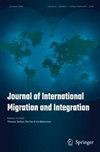荷兰和波兰的脱钩空间:周边和萎缩地区收容非欧盟移民的新兴地方治理网络
IF 1.3
Q3 DEMOGRAPHY
Journal of International Migration and Integration
Pub Date : 2023-06-05
DOI:10.1007/s12134-023-01057-1
引用次数: 0
摘要
移民研究的很大一部分致力于了解欧洲大城市如何处理国际移民的涌入,无论是被迫的还是自愿的。然而,农村和周边地区很难被确定为新移民的接收地区。在这里,经济退化、人口减少和宜居性是学术辩论的中心。尽管如此,外围地区和萎缩地区越来越被视为接纳非欧盟移民的有利地点,尤其是寻求庇护者、难民和被认可的难民。在我们的研究中,我们通过考察荷兰和波兰衰落的周边小城市和农村社区如何应对非欧盟移民的到来和定居,将这两种辩论结合起来。我们确定了不同的脱钩空间,以便更好地理解有关移民治理的地方政策话语与国家政策话语之间的关系。从我们的研究来看,在这些脱钩的空间中,形成了替代的跨区域治理网络来容纳新移民,在某些情况下,移民被认为是解决人口下降的灵丹妙药。在这些网络中,非政府组织和志愿者的主要努力比在城市环境中更为突出。本文章由计算机程序翻译,如有差异,请以英文原文为准。
Spaces of Decoupling in the Netherlands and Poland: Emerging Local Governance Networks for Hosting Non-EU Migrants in Peripheral and Shrinking Areas
Abstract A significant share of migration studies is dedicated to understanding how large cities in Europe deal with the influx of international migrants, forced and by choice. Rural and peripheral regions, however, are hardly identified as receiving areas for migrant newcomers. Here, economic degradation, population decline and liveability are at the centre of academic debate. Nevertheless, peripheral—and shrinking—areas are increasingly regarded as favourable locations for hosting non-EU migrants, in particular asylum seekers, refugees and recognised refugees. In our study, we combined the two debates by examining how declining small peripheral cities and rural communities in the Netherlands and Poland deal with the arrival and settlement of non-EU migrants. We identified different spaces of decoupling to better understand how local policy discourses on migration governance relate to national ones. From our study, it appears that in these spaces of decoupling, alternative, cross-regional governance networks are formed to host migrant newcomers, and in some cases, migration is framed as a panacea for the decline. Within these networks, the leading efforts of non-governmental organisations and volunteers stand out and are more prominent than in urban contexts.
求助全文
通过发布文献求助,成功后即可免费获取论文全文。
去求助
来源期刊
CiteScore
2.70
自引率
7.70%
发文量
82
期刊介绍:
The Journal of International Migration and Integration (JIMI) is a multidisciplinary peer-reviewed scholarly journal, which publishes original research papers, policy discussions and book reviews that enhance the understanding of immigration, settlement and integration and that contribute to policy development. The Journal of International Migration and Integration consistently covers a wide array of subject areas, including labor market integration, refugee status in various nations, adaptation strategies of immigrants in industrialized settings, racial and gender variations in migration, the role of social work in the integration of new citizens, and retention of ethnic and older national identities in new environments. These are issues of concern throughout the world. The journal looks at the social world with a fresh vision enhanced by the basic and applied social sciences. JIMI welcomes papers based on original research, critital policy debates and comparative analyses. Submissions and subscriptions are open to all.

 求助内容:
求助内容: 应助结果提醒方式:
应助结果提醒方式:


